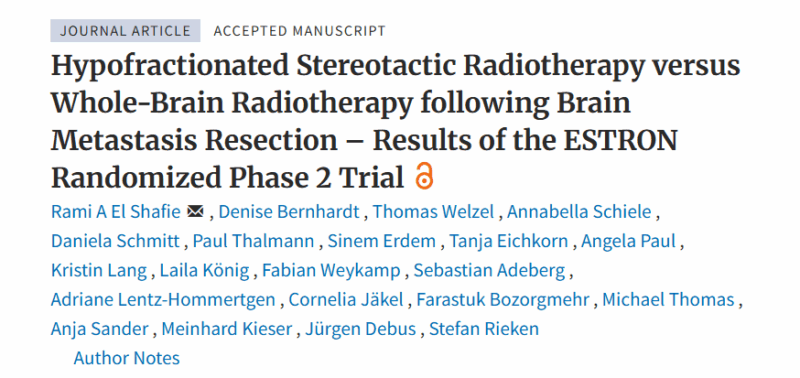Gustavo Viani, Associate Professor at Faculty of Medicine of Botucatu, São Paulo State University (UNESP), shared on LinkedIn about recent paper published in Neuro-Oncology.
“ESTRON Trial: Can We Skip WBRT After Brain Met Resection?
Objective
- Compare hypofractionated stereotactic RT (HFSRT, 35 Gy/7 fx) vs. whole-brain RT (WBRT, 30 Gy/10 fx) after brain metastasis resection
- Assess intracranial control, toxicity, and neurocognitive outcomes
Methods
- Phase 2, randomized, single-center, 54 patients
- ≤10 additional unresected metastases allowed
- HFSRT: Robotic radiosurgery, 3 mm CTV margin
- WBRT: 3D-CRT, no hippocampal avoidance
- Primary endpoint: Intracranial progression-free survival (ic-PFS)
- Secondary endpoints: Local control (LC), overall survival (OS), leptomeningeal disease (LMD), toxicity (CTCAE v5.0), neurocognition (HVLT-R)
Key Results
- 2-yr LC: 94% (HFSRT) vs. 85% (WBRT)
- Toxicity: 54 TRAEs (HFSRT) vs. 115 (WBRT)
- Alopecia in 89% WBRT vs. 0% HFSRT
- Better neurocognitive preservation with HFSRT; cognitive improvement over time vs. decline in WBRT
- LMD: 27% (HFSRT) vs. 9% (WBRT)
- OS median: 17.8 vs. 27.0 months (NS)
Takeaway
- HFSRT provides excellent local control and lower toxicity while preserving cognition
- Higher LMD risk requires vigilant MRI follow-up for early detection and salvage.”
Title: Hypofractionated Stereotactic Radiotherapy versus Whole-Brain Radiotherapy following Brain Metastasis Resection – Results of the ESTRON Randomized Phase 2 Trial
Authors: Rami A El Shafie, Denise Bernhardt, Thomas Welzel, Annabella Schiele, Daniela Schmitt, Paul Thalmann, Sinem Erdem, Tanja Eichkorn, Angela Paul, Kristin Lang, Laila König, Fabian Weykamp, Sebastian Adeberg, Adriane Lentz-Hommertgen, Cornelia Jäkel, Farastuk Bozorgmehr, Michael Thomas, Anja Sander, Meinhard Kieser, Jürgen Debus, Stefan Rieken
Read The Full Article at Neuro-Oncology.

More posts featuring Gustavo Viani.
